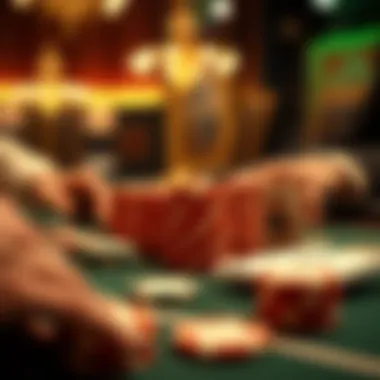Understanding the Strategy of Never Splitting Tens in Blackjack


Intro
When it comes to blackjack, there's a saying that floats around the tables: "Never split tens." At first glance, this recommendation may seem puzzling to many players. Why would you ever want to keep a strong hand like a pair of tens together instead of risking it by splitting? The answer lies within the details of basic strategy in blackjack and the mathematical probabilities that come into play.
In this article, we’ll unpack the rationale behind this maxim and provide insights into how it can affect your overall gameplay. We’ll explore not just the reasoning that underpins this strategy but also the potential outcomes you might encounter when deviating from it. By understanding the principles of blackjack strategy, you’ll be better equipped to make calculated decisions that can lead to success at the tables.
Betting Strategies
Mastering blackjack is not only about knowing when to hit or stand; it also about managing your bets wisely. Understanding the nuances of betting strategies can be a game changer. Here, we’ll delve into some vital aspects, including bankroll management and how to analyze betting odds in a way that aligns with the idea of maintaining a strong hand like that of two tens.
Bankroll Management
One could say that managing your bankroll is akin to laying the foundation for a house. If the foundation is shaky, the entire structure is at risk. Proper bankroll management involves splitting your total funds into portions so that you can sustain gameplay while minimizing the risk of total loss. Here’s how it can relate to the maxim of never splitting tens:
- Set a limit. Determine how much you're willing to lose before sitting down at the table. Stick to it.
- Bet a consistent amount. Avoid the temptation to increase your bet wildly because of a winning or losing streak; it can lead to rash decisions, like splitting those tens!
- Adjust according to game dynamics. If you notice favorable conditions at the table, it may make sense to increase your bets while maintaining a sensible approach.
Analyzing Betting Odds
To play the game effectively, players must analyze the odds against them. For instance, keeping the pair of tens together capitalizes on the likelihood of achieving a strong total. When you choose to split tens, you significantly reduce the potential winning combination. Here's where understanding the odds can make a difference:
- The house edge favors the dealer, making it crucial to play your cards smart.
- The value of keeping a strong hand is often underestimated by novice players, who may be drawn to the risky allure of splitting.
Closure
Understanding why it’s generally advised to never split tens in blackjack is integral to developing a solid strategy. The insights in this article highlight key elements of effective gameplay, from managing your bankroll to grasping the dynamics of betting odds. In a world where intuition often leads players astray, awareness and strategy can make all the difference between a winning session and a costly mistake.
Understanding Blackjack Fundamentals
To grasp the concept of never splitting tens in blackjack, one must first understand the foundational elements of the game. The rules and dynamics of blackjack are steeped in both tradition and strategy, which can significantly impact decision-making at the table. Even if you're just getting your feet wet, the underpinning principles can shape a player’s success story.
Blackjack operates on a relatively straightforward mechanic, but the subtleties can boggle the mind. Players compete against the dealer, aiming to beat their hand without exceeding a total of 21. Each card assigned holds varying values: numbered cards correspond to their face values, while face cards—Kings, Queens, and Jacks—are worth ten, and Aces can be one or eleven based on the player’s preference. This blend of simplicity in the basic idea and complexity in strategic execution is where many players falter.
The importance of mastering these fundamentals cannot be overstated. Familiarity with the game's mechanics acts as a launching pad for strategic thinking. A deep understanding equips players with the knowledge to evaluate risks better, thus informing decisions like whether to hit, stand, or split.
Consider the blend of luck and skill; at times, the cards might not fall your way, but familiarity with the fundamentals allows for informed choices at critical moments.
Thus, recognizing the basic strategy—like when to hit or double down—becomes essential. Mastering blackjack’s game mechanics is your rudder in navigating potential pitfalls, like the alluring but often misguided urge to split a pair of tens.
Game Mechanics
The mechanics of blackjack, while seemingly simple, can reveal layers of strategy and decision-making that will affect outcomes dramatically. The game starts with the dealer and players receiving two cards, all while ensuring an electrifying atmosphere in the casino. One key element to understand is the dealer's role— is there an extra layer of strategy when you see that face-up card? Absolutely.
Blackjack uses the basic principle of bust or survive; all players want to hang on to their hands and navigate through the dealer’s threats while avoiding that dreaded bust. Decisions hinge on how the collective values compare, which adds a layer of depth to what might seem like a simple card game.
Basic Strategy Overview
At its core, a basic strategy in blackjack focuses on maximizing winning potential while minimizing losses based on statistical probabilities. This strategy walks players through scenarios dictated by both their hands as well as the dealer’s visible card. A well-defined strategy lays out whether hitting, standing, or doubling down is optimal through a series of established guidelines—think of it as your blackjack GPS, designed to steer you clear of treacherous roads.
To clarify some common guidelines:
- Always stand when having a hard 17 or higher.
- Hit on 11 and below, taking calculated risks.
- The approach toward soft hands—where an Ace can present as 1 or 11—also shifts, usually leaning toward a more aggressive stance.
Understanding these mechanics encourages adaptability, allowing players to pivot according to the cards at hand. This foundational knowledge will serve as a critical backdrop to later analysis on splitting tens and navigating the implications of that choice.
The Importance of Hand Values
Understanding hand values in blackjack is key to successful gameplay. The strategy of not splitting tens is firmly rooted in the fundamentals of these values. Recognizing what a strong hand represents, particularly when holding a pair of tens, can shape the decisions a player makes at the table.
When calculating the value of a hand, players must remember the basic rules: number cards are worth their face value, while face cards—queens, kings, and jacks—are valued at ten. Aces can be counted as either one or eleven, depending on what suits the hand best. This fundamental equation creates a landscape where a total of twenty, achieved through two tens, stands as one of the most formidable positions at the table.
Maintaining a solid hand value not only increases chances of winning against the dealer but also builds a psychological advantage. Opponents may feel pressure when they see a high hand, leading them to make riskier choices.
Additionally, understanding hand values comes with its benefits. Maximizing the potential of a strong hand, while minimizing errors due to miscalculated risk-taking, is within reach for those who can gauge hand values accurately. In the end, grasping the significance of hand values provides a well-rounded approach to blackjack. It's not just about playing the cards but also about playing the game smarter than your opponents.
Calculating Hand Totals
Calculating hand totals in blackjack is a straightforward yet crucial aspect of the game. When you have two tens, the sum is a clear twenty. This total gives players substantial leverage against a dealer. Let’s go over some vital points on how to effectively calculate.
- Add Together Face Values: Start with the face values of the cards. For tens, that’s easy; you simply count it as ten.
- Consider Aces Carefully: If you hold an ace alongside a ten, you have a blackjack! That’s an unbeatable hand unless the dealer also has one.
- Keep Track of Potential Outcomes: Always be mindful of the cards left in the shoe. Though you might feel great about a total of twenty, know what the dealer's up card is, and what they might draw.


An awareness of how to calculate hand totals accurately can make or break a session at the table. As the game progresses, ensure you remain vigilant, adjusting your calculations according to the evolving game dynamics.
Understanding Face Cards
The role of face cards in blackjack cannot be overstated. These cards—jacks, queens, and kings—carry the same value as tens. Therefore, when considering your hand, it’s vital to recognize that two face cards equal a total of twenty as well. Here’s where it gets interesting:
- Strategic Relevance: When analyzing your hand against the dealer’s visible card, knowing that a twenty is around the corner if you have face cards can help bolster your confidence.
- Potential for Stronger Hands: If you hit a face card when holding an ace, you may decide to play that hand aggressively, tempting fate while still being in a strong position.
- Psychology at Play: Onopponents also see face cards as threats. When they realize multiple face cards are in play, it can create tension and influence their betting behavior.
Understanding face cards adds another layer to your strategic gameplay. Not only are their values equal to tens, but they also present a psychological factor that can sway the entire game. When combining hand values with the strategic significance of face cards, players can effectively navigate the complexities of blackjack with confidence.
The Case for Not Splitting Tens
In the world of blackjack, the decision of whether to split pairs can be a game changer, particularly when it comes to a pair of tens. The case for not splitting tens rests on deeper strategic insights drawn from probabilities, hand values, and situational dynamics. Understanding this choice is essential for both newcomers and seasoned players. The core argument against splitting tens hinges on the formidable resultant hand values one can achieve, combined with the mathematical probabilities at play.
Mathematical Probabilities
When holding a pair of tens, the player’s hand totals twenty — a strong position in most scenarios. Conceptually, let’s break down why splitting tens results in a mathematical misstep.
- Winning Hand: A value of twenty is statistically a winning hand against a dealer's perceived value. Common dealer up cards can be combated more effectively with this total.
- Chances of Improvement: If split, you transform your surety into two chances that might not yield a winning result. The new hands can land anywhere from weak to moderate totals, often underperforming.
- Discarding Potential: By splitting tens, you forfeit the opportunity to play a strong hand that, under normal circumstances, often stands against most dealer faces.
The mathematics here is clear. Keeping those tens leads to a higher probability of winning, whereas breaking them down diminishes the hand’s overall strength. Using basic strategy charts, you can see how often a total of the original hand translates into victory.
Interestingly, many mathematicians specializing in gambling argue that the fundamental approach of not splitting tens derives from basic probability theory. Research conducted on blackjack outcomes indicates a strong 4-to-1 or even 5-to-1 advantage when keeping a pair of tens intact on average, compared to the uncertain outcomes when split. Just putting it into perspective; holding onto those twenty points often wins you the pot without breaking a sweat.
Potential Outcomes of Splitting
Now, let’s consider the possible outcomes when you do decide to split a pair of tens. A rash decision to split can lead to dire consequences for your score and your wallet. Here are possible outcomes you could face:
- Weak New Hands: After splitting, each new hand needs a card to continue, and often those can yield less optimal hand values like 12 or 17, exposing the player to risk.
- Increased Variance: Splitting can lead to a no-win situation where neither hand achieves a respectable score, leaving the player with losses instead of capitalizing on potential strengths.
- Loss of Control: Players can overextend into a strategy that relies on too many ups and downs, making the game unpredictable and leading to frustration. Instead of methodical play, it becomes swingy and erratic.
It’s essential to step back and evaluate – does splitting actually serve your chances? Most often, the evidence suggests otherwise.
"In blackjack, a strong hand is more lucrative than two weak ones; don’t throw away potential.”
For those pondering the wisdom of risk versus reward, a solid rule of thumb aligns itself with keeping the tens as one unified power. The best gameplay often comes from harnessing strong beginnings rather than gambling them away piece by piece. Instead of splitting, consider adjusting your approach against the dealer and reinforcing your strategy based on solid ground.
As you delve further into blackjack strategies, always remember that what seems right in the moment may not hold up against the mathematical framework guiding optimal choices. In the case of splitting tens, the statistics often speak volumes.
Evaluating the Risks
In blackjack, evaluating the risks associated with splitting tens is crucial for players looking to make informed decisions at the table. The very nature of gambling hinges on understanding the probabilities and outcomes that can affect gameplay. When players hold a pair of tens, they face a significant decision that could alter the course of the game. Keeping these tens intact generally offers a strong hand with a total value of 20, which is impressive in most scenarios.
However, the thrill of wanting to double down or play multiple hands can tempt players to split their tens. The key consideration here is to weigh the potential benefits against the inherent risks. Here are several factors to keep in mind:
- Hand Strength vs. Risks: A hand totaling 20 is a favorite among any player. The immediate risk of splitting can negate this advantage, significantly lowering the chance of winning compared to playing a strong single hand.
- Dealer's Position: The dealer's up card plays a big role in decision-making. If the dealer shows a face card or an ace, splitting could lead players into shaky territory. A strong dealer hand often spells disaster for split tens.
- Emotional Influence: It’s easy for players to let emotions dictate strategy. The fear of missing out on potential wins and being led by the excitement of playing multiple hands can cloud judgment.
Ultimately, understanding these risks allows players to focus on maintaining a solid hand rather than giving in to the urge of splitting. A well-thought-out approach here can be the difference between a substantial win and a painful loss.
Dealer's Up Card Influence
The dealer's up card stands as a pivotal element in evaluating the overall risk of splitting tens. Suppose a player faces a dealer displaying a strong card like a king or an ace. In those circumstances, the probability shifts significantly against the player. The dealer has a high chance of making a hand that can beat the player's resulting split.
Conversely, if the dealer shows a lower card, like a three or four, the dynamics change. Splitting might yield a better chance of winning because the dealer may struggle to reach a decent total. However, even with favorable conditions, two separate hands starting with ten could still falter against a single powerful dealer hand. Hence, players are advised to carefully consider the dealer’s position before making any move.
Player's Position at the Table
The seating arrangement at a blackjack table also subtly impacts strategies regarding splitting tens. While decisions are often made subjectively, a player's position relative to the dealer affects potential outcomes. A player seated later has the advantage of reading other players’ actions and assessing the collective table dynamics before making a choice.
Here’s how position matters:
- Early Position: Players sitting in earlier positions must often commit to decisions without the benefit of watching others play. This could lead to more conservative strategies, sticking with strong hands like tens.
- Late Position: Those at the end of the betting order can observe how other players react to their hands, particularly in how they interact with the dealer’s up card. The insights gained can provide significant advantages, serving either as reinforcement to hold tens or a signal that splitting may not be so wise.
- Bets Size and Table Image: A player's image can also influence how others play against them. Maintaining a confident demeanor might encourage more aggressive play from opponents, impacting the risk factors against the player’s split strategy.
In summary, both the dealer's up card and the player's position are vital components of risk evaluation when considering whether or not to split tens in blackjack. Understanding and analyzing these nuances helps players devise a strategy that maximizes potential gains while minimizing losses.
Expert Opinions on Split Decisions
In the world of blackjack, few topics stir intensity and debates quite like the strategy of splitting tens. While many players might instinctively lean towards splitting to enhance their chances, the perspectives from seasoned professionals reveal a panorama of reasoning that might just shatter preconceived notions. By exploring expert opinions on this topic, we garner a more nuanced understanding of why the maxim ‘never split tens’ holds validity.
Insights from Professional Players


When engaging seasoned players, one finds a consensus regarding the pitfalls of splitting tens. Professional players understand the critical nature of hand values in blackjack. Holding a pair of tens culminates in a total of twenty, which is a solid and often unbeatable hand against the dealer's potential totals.
For example, notable blackjack author and pro player, Stanford Wong, underscores that while it might sound tempting to create two potentially winning hands, the mathematical reality is stark. "The odds of drawing favorable cards that can beat a dealer's twenty simply are not in your favor. You’re essentially gambling with a hand that is already robust."
Another professional, Anthony Curtis of the Las Vegas Advisor, notes that splitting tens can lead to weaker hands that might contribute to losses. His main argument rests on the risk of weakening a strong standing hand to explore uncertain outcomes. This perspective emerges from years of tracking game dynamics and outcomes. Experienced players recognize that maintaining a firm twenty offers a far greater strategic advantage than the gamble of splitting.
Statistical Analysis of Hand Splitting
Delving into statistical analysis sheds further light on the folly of splitting tens. Many gambling strategists utilize simulations and historical data to understand the outcomes of various actions. Split decisions, especially with tens, reveal a pattern showing that players often leave themselves vulnerable to the dealer's stronger hand.
Studies highlight that players who opt against splitting tens win approximately 90% of the time when the dealer shows a weaker up card (between 2 and 6). Meanwhile, the success rate of those who split falls significantly, often leading to outcomes where the initial strength of their hand diminishes:
- Starting with 20: The win percentage stands strong due to the high total.
- After splitting to two hands: The win percentage decreases sharply, often resulting in losses.
- Post-split leveraging: The likelihood of achieving another strong hand diminishes as the game progresses.
In summary, the statistical insights paired with expert opinions present a compelling case for maintaining tens as a single, robust hand. Making decisions based on data and holistic gameplay strategies can significantly influence one's success in blackjack. Overall, understanding these expert perspectives allows players to forge stronger strategies baked in logic rather than impulse.
Remember, in blackjack, it’s about playing the odds, not the feelings.
By adopting a reasoned approach and valuing knowledge from industry veterans, players can enhance their performance, keep their bankroll healthy, and ultimately enjoy the game more.
Additionally, resources such as Wikipedia's Blackjack Guide and Britannica can provide further insights into strategies and fundamental concepts.
Common Misconceptions
In the world of blackjack, like many games with a human element, misconceptions run rampant. These misbeliefs can shape a player’s approach to the game, often steering them toward choices that are not strategically sound. The section aims to clarify these common myths surrounding the strategy of never splitting tens, providing insights that can transform the way one approaches gameplay and decision-making in a blackjack setting.
Belief in Winning with Splits
Many players, especially novices, hold an unwavering belief that splitting tens can lead to a greater chance of winning. This misconception often springs from a basic misunderstanding of how hand values work in blackjack. While it’s true that splitting can, in some situations, open the door to hitting strong combinations, splitting tens is fundamentally flawed.
Tens are already a formidable hand totaling twenty, which stands tall against most dealer upcards. The probability of consistently creating a stronger hand through splitting becomes thin. For instance, if a player splits two tens, they hand over one of the strongest starting points in blackjack for potentially weaker hands. It’s like giving up a winning lottery ticket for a shot at two smaller prizes. Furthermore, the odds of drawing another ten or face card diminish significantly. This line of thinking leads to greater losses than many anticipate.
The Myth of Doubling Down Post-Split
Another prevalent myth revolves around the idea of doubling down after a split, creating an expectation of increased profits. This notion requires a deeper look into the dynamics of blackjack. Splitting tens occasionally tempts players to double down on at least one of the resulting hands. However, this practice falsely elevates the perception of potential gains from splitting. In reality, it’s little more than a gamble disguised as strategy.
When players choose to double down following a split, they risk further diminishing their potential total to a much weaker hand. The primary tenets of hitting and standing should guide choices—doubling down should not follow a split of tens due to the initial strength of the hand. Statistically, doubling down on a split hand typically results in avoiding more losses rather than reaping the rewards of further winnings. Many seasoned players can attest to instances where misguided beliefs around doubling down on splits led to dwindling bankrolls.
In the end, debunking these notions is crucial for players aiming to master strategic play in blackjack. Recognizing the truth behind these misconceptions allows for a clearer view of player advantage and smarter decisions at the table.
"Success in blackjack requires more than just luck; it demands an understanding of strategy that transcends common misconceptions."
Broader Strategic Implications
In blackjack, the decision to never split tens has far-reaching consequences beyond the immediate hand. It’s essential to grasp the broader strategic implications connected to this choice. Players often zone in on the immediate consequences without recognizing how these choices fit into their overall approach. A solid strategy is not just about playing cards individually but about weaving together decisions that improve long-term outcomes.
Building a Strong Betting Strategy
Creating a robust betting strategy is vital for consistent success at the blackjack table. Players should understand that their bets are not just random acts; they’re carefully calculated moves in a larger game. When holding tens, betting big can be tempting, but it’s crucial to balance aggression with common sense. Here are some points to consider:
- Establish a Bankroll: Set a budget for your session and stick to it. This discipline helps focus on the game, rather than losing sight of the big picture.
- Bet Sizing: Keep your bets proportional to your total bankroll. For instance, if your bankroll is $500, placing a bet of $10 to $50 may work well, depending on your comfort level.
- Utilizing Momentum: Capitalize on winning streaks and adjust your bets strategically, rather than being swayed solely by momentary wins or losses.
These elements highlight the need for players to assess their situations dynamically. The best blackjack players adapt their bets based on their hand but also factor in the broader table dynamics.
Adjusting Strategies Based on Gameplay
Flexibility is key in blackjack. A savvy player will adjust their gameplay according to how the game unfolds, rather than adhering rigidly to pre-established rules. Consider the following strategies:
- Assessing the Dealer’s Up Card: If the dealer shows a weak card, such as a 5 or 6, players can capitalize on it by playing more aggressively with their strong hands.
- Table Composition: Pay attention to the other players and their betting trends. For example, if you notice other players adopting an aggressive strategy, it might be wise to play more conservatively.
- Your Own Table Position: Where you sit at the table can affect your strategic choices. Being the first player to act allows for a reactive strategy, while being last can enable you to see others’ actions before making your move.
Ultimately, the ability to adjust based on gameplay helps you seize opportunities that arise during a session. By embracing a fluid strategy, you ensure your approach doesn’t become stale or predictable.
“Strategy in blackjack is much like surfing; reacting to the ebb and flow of the game will keep you afloat.”
By keeping both the immediate situation and the broader implications in mind, players can navigate the complexities of blackjack with greater ease and confidence.
Analyzing Gameplay Scenarios
When it comes to blackjack, knowing when to hold your cards versus when to take risks can make all the difference in your results. Analyzing gameplay scenarios, particularly under the framework of the strategy of never splitting tens, serves as a crucial component of a player's decision-making process. Such analysis allows players to engage with the nuanced realities of the game, factoring in elements like the dealer's up card, table dynamics, player positions, and the stakes involved. Evaluating these scenarios can provide valuable insights that might not be readily apparent, thereby equipping players with tools to better navigate the uncertainties of casino gameplay.


Understanding actual scenarios can help solidify concepts that seem abstract. They lay out real-world implications of theoretical strategies. For instance, players can postpone emotional reactions, focusing instead on the fundamental aspects of the game. With an analytical mindset, a player might weigh avoiding splitting tens against the dealer's likelihood of busting. This is where deep thought and keen observation intersect.
Scenario One: Dealer Shows Weakness
In a scenario where the dealer shows a weak up card—like a 4, 5, or 6—it becomes vital to recognize this signal. These cards increase the likelihood of the dealer busting. Players holding tens view this situation with great advantage. Rather than splitting tens, which can dilute a strong hand, keeping the pair intact enables one to leverage their high value. The ten-count, totaling 20, is highly favorable. This method capitalizes on the dealer’s disadvantage while maintaining a robust hand.
- By keeping the tens, players:
- Enhance their chances of winning based on dealer mechanics.
- Maintain the power of a strong hand while putting pressure on the dealer.
- Reduce the volatility of splitting, which could lead to risky smaller hands.
Some players mistakenly think splitting gives a chance to build an even stronger position. However, the dealer's vulnerability should guide their choices. Mathematical probabilities also support this approach: the likelihood of encountering a favorable outcome staying at 20, as opposed to splitting into potentially weaker hands, tends to favor the former.
Scenario Two: High Stakes Table
When engaging in a high stakes table, emotions and pressure run high, which can cloud judgment. Players could be swayed by the thrill of churning out multiple hands, especially given the atmosphere created by high-stakes betting. However, in this scenario of holding tens, the importance of sticking to sound strategy cannot be overstated.
In high stakes situations, the tendency to split tens might stem from a desire for excitement or a misjudgment of risk. But this isn't about entertainment; it’s about maximizing gain. A player must remember:
- Potential Gain: The payout on a hand of 20 stands at a solid chance against a dealer's weaker hand.
- Risk Management: Entering into splitting means risking both hands against the dealer, which can backfire under pressure.
Maintaining composure and focusing on core strategies fosters clarity. In high stakes, emotions must take a backseat to strategy; otherwise, a player could find themselves shortchanged by needless splits. In this setting, leveraging the strength of tens while assessing the dealer’s possibilities might very well lead to a situation where success can be achieved through disciplined, strategic play.
Analyzing these varied scenarios enables players to adapt their strategies effectively, leading to a more informed gameplay experience. Think critically about your moves, and stay rooted in the statistics—this is how a smart gambler carves out their edge in the world of blackjack.
Remember, never splitting tens isn’t merely a catchphrase; it’s a well-founded strategy that benefits from careful analysis and thoughtful execution.
Practical Tips for Blackjack Players
In the world of blackjack, making the right move can be the difference between walking away with a smile or leaving empty-handed. The concept of practical tips is crucial for any player looking to sharpen their edge. While strategies like never splitting tens stand strong in the wake of logic, it’s also essential to develop a well-rounded approach to gameplay that encompasses managing your funds and understanding the nuances at the table.
Managing Your Bankroll
One of the foremost strategies in blackjack revolves around effectively managing your bankroll. Players should approach each session with a clear limit on how much they are willing to spend. This disciplined method not only helps in avoiding significant losses but also allows for a more relaxed and enjoyable experience. Here are a few key points to consider:
- Set a Budget: Before any game, decide on a specific amount that you are comfortable losing. This ensures you play within your means.
- Divide Your Funds: Consider breaking your bankroll into smaller units for each session. This approach enables you to play longer and reduces the temptation to chase losses.
- Adjust Bet Sizes: Depending on your bankroll and the current game dynamics, adjust the size of your bets. If you're riding a winning streak, it might be tempting to bet larger; conversely, in a rough patch, it’s wise to scale back and preserve your funds.
Adhering to these principles of bankroll management can not only prolong your gaming experience but can also elevate your strategic play overall. If you don't control your money, it might control you.
Recognizing Table Dynamics
Understanding the dynamics of the table—how the game is unfolding and how other players are behaving—can be as critical as knowing the mathematical probabilities of blackjack. The physical and emotional environment of the game deeply influences decision-making. Here’s what to keep in mind:
- Observe Other Players: Take note of how aggressive or conservative others are betting. If you see a player consistently hitting on low totals against a dealer showing a strong up card, you might want to adjust your own strategy accordingly.
- Dealer's Up Card: Pay particular attention to the dealer's face-up card. The strength of this card can significantly impact your decisions. If the dealer shows a weak card, for example, it might be beneficial to hold your tens rather than risk splitting.
- Shift in Game Tempo: The pace of play can also change the atmosphere. If a lot of chips are being exchanged quickly, it might spur either excitement or anxiety—two different emotional states can lead players to make different choices.
In blackjack, reading the room is just as vital as reading the cards. While the strategy of never splitting tens is rooted in sound logic, it can only serve you well if paired with a keen understanding of the overall gameplay and dynamics at the table. Together, effective bankroll management and a solid grasp of table dynamics create a robust framework for successful blackjack play.
The End: The Wisdom of Holding Tens
In the world of blackjack, the debate over whether to split tens is as heated as a summer night in the desert. Yet, the prevailing consensus among seasoned players is clear: hold your ground and keep those tens together. This conclusion isn’t simply based on superstition or personal preference; rather, it’s grounded in robust statistical analysis and strategic reasoning. By maintaining the ten-total, players not only shield themselves from unnecessary risks but also capitalize on a heightened probability of winning.
When considering the merits of holding tens, two key elements arise. First, a total of twenty equates to one of the strongest hands in the game. Players will find themselves in a position where most dealer hands will struggle to match or exceed that total. Secondly, the potential outcomes of splitting into two separate hands often lead to diminished returns. Splitting tens means parting ways with an already powerful hand, setting oneself up for a scenario that could curtail potential wins instead of enhancing them.
In addition to the foundational understanding of hand values, the importance of situational awareness comes into play. A player's keen observation of the dealer's up-card and the dynamics at the table can offer further insight into gameplay strategies. For instance, if the dealer's up-card is weak, one might feel tempted to split for a chance at increased gains. However, wisdom dictates that sticking with the hand’s original strength often trumps the alluring prospects of splitting.
"In blackjack, as in life, sometimes it’s best to stay put rather than chase every fleeting chance."
Ultimately, embracing the wisdom of holding tens reflects a broader strategy that extols consistency over recklessness. Many novice players fall victim to the allure of splitting, driven by the desire to transform what appears to be a good opportunity. However, awareness of the reality that a singular powerful hand often trumps multiple weaker hands empowers the player’s decision-making process.
As we draw this analysis to a close, it becomes evident that the best strategy in blackjack is not always about taking risks. It's about making informed decisions based on the fundamentals of the game. By holding tens rather than splitting, players can cultivate a stronger position, allowing them to play with confidence and a deeper understanding of the game’s underlying principles.
Summarizing Key Insights
We’ve navigated through a maze of mathematical probabilities, strategic evaluations, and expert insights regarding the chess-like maneuvers of blackjack. As we've seen:
- The likelihood of winning stays significantly higher when not splitting tens.
- Splitting leads to two weaker hands, instead of relying on the already formidable total of twenty.
- Knowledge of the dealer's up card is vital, as is understanding one's position at the table.
- Expert opinions consistently favor maintaining strong hands over risking them for uncertain payoffs.
These insights echo the age-old strategy that in blackjack, patience paired with informed decision-making is critical for swaying the odds in one’s favor.
Embracing Optimal Strategies
To truly harness the power of your gameplay, one must adopt a mindset centered around optimal strategies. Here’s how you can solidify your standing:
- Stay Informed: Continuously brush up on strategies by reading literature and analyzing gameplay statistics. This will keep your knowledge fresh and applicable.
- Practice Makes Perfect: Engage in practice sessions, both online and at the table, to strengthen instincts. Familiarity with varied situations sharpens decision-making skills.
- Buckle Up for the Long Haul: Understand that blackjack is not just a game of chance. It's about playing the long game. Keep your focus on big-picture results rather than individual hands.
- Consistency is Key: Stick with proven strategies. Trusting the strength of your ten total can prevent erratic decision-making.
- Group Dynamics: Observe and learn from the players around you. Different tables bring different atmospheres and strategies that can illuminate aspects of the game you may not have considered.
Adopting these strategies will not just help you safeguard your bankroll, but also bolster your overall game savvy. So, next time you sit down at the blackjack table, remember: it’s not always about chasing the next big win; sometimes, the wisest choice is simply to hold your ground.







